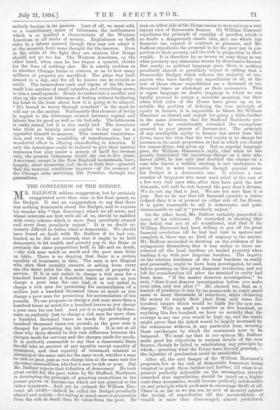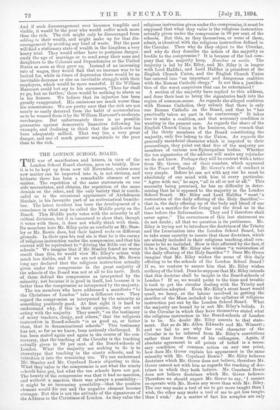THE CONCLUSION OF THE BUDGET.
M.R. BALFOUR seldom exaggerates, but he certainly exaggerated more than once in his final speech on the Budget. It was an exaggeration to say that there was nothing democratic about the Budget, and to express his wonder why "that democracy which we all serve, and whose interests are first with all of us, should be saddled with every scheme which is more than peculiarly absurd and more than peculiarly unjust." It is no doubt ex- tremely di cult to define what is democratic. We should have found no fault with Mr. Balfour if he had con- tended, as he did not contend, that it ought to be held democratic to let wealth and poverty pay to the State in precisely the same proportions both in life and on death, —the rich man much on much and the poor man little on little. There is no denying that there is a certain equality of treatment in that. The man is not illogical who says that equality consists in asking from every one the same price for the same amount of property or service. If it is not unfair to charge a rich man for a hundred loaves just a hundred times as much as you charge a poor man for one loaf, it is not unfair to charge a rich man for protecting his accumulation of a million just a hundred thousand times as much as you charge a poor man for protecting his accumulation of ten pounds. No one proposes to charge a rich man more than a hundred times as much for a hundred loaves as you charge a poor man for one loaf. And yet it is regarded by demo- crats as perfectly just to charge a rich man far more than a hundred thousand times as much for protecting a i hundred thousand times ten pounds, as the poor man is charged for protecting his ten pounds. It is not at all clear why there should be this vast difference between the charges made for services and the charges made for goods. It is perfectly reasonable to say that a democratic State should take no account of any equality except equality of treatment, and that equality of treatment consists in charging at the same rate for the same work, whether a man be rich or poor, just as you charge him at the same rate for the same commodities, whether a man be rich or poor. But Mr. Balfour rejects that definition of democracy. He took great credit for the part taken by Sir Stafford Northcote in developing the principle of granting exemptions to the poorer payers of Income-tax 'which are not granted to the richer taxpayers. And yet he refused Sir William Har- court all credit,—indeed he called his Budget peculiarly absurd and unjust,—for taking so much more in proportion from the rich at death than he takes from the poor. No man on either side of the House seems to us to tale up a very logical view of democratic finance. Sir William Harcourt repudiates the principle of equality of sacrifice, which is no doubt a dangerously elastic idea, and one which any financier can expand or contract at pleasure, and Mr. Balfour repudiates the proposal to let the poor pay in pro- portion to their poverty, and the rich in proportion to their wealth. It is therefore by no means an easy thing to say what precisely any statesman means by democratic finance. But surely, as political language goes, there is nothing peculiarly absurd or peculiarly unjust in calling that a Democratic Budget which relieves the majority of tax- payers who have hardly any superfluities at all, at the cost of those whose superfluities are a thousand or ten thousand. times as abundant as their necessaries. This is vague language no doubt, language to which we can hardly pretend. to assign a scientific meaning, but then when both sides of the House have given up as in- soluble the problem of defining the true principle of equity in finance, it is impossible to blame Sir William Harcourt as absurd and unjust for going a little further in the same direction that Sir Stafford Northcote pur- sued when he considerably extended the exemptions granted to poor payers of Income-tax. The principle of any intelligible equity in finance has never been laid. clown, since the idea that the real equity is to charge for incomes in the same proportion as that in which you charge for commodities, was given up. But as popular language goes, Sir William Harcourt's reply, that while he has greatly diminished the maximum charge on a man who leaves X800, he has only just doubled. the charge on a man who leaves a million sterling, is not inadequate to prove that in some reasonable though popular sense his Budget is a democratic one. It relieves a vast number of taxpayers who most need relief at the cost of a few very rich ones who, after they have paid the new demands, will still be rich beyond the poor man's dreams. We do not say that is just. We are not sure that it is just. But we do say that till financial equality is better defined than it is at present on either side of the House, it is quite reasonable to call it democratic, and quite unreasonable to call it "peculiarly unjust."
On the other band, Mr. Balfour certainly succeeded in many of his criticisms. He succeeded in showing that the deficit was not at all sensational, and that if Sir William Harcourt had been willing to put off his great financial revolution till he had had time to mature and complete it, there was no kind of urgency in the matter. Mr. Balfour succeeded in showing on the evidence of his antagonists themselves, that it was unfair to leave un- relieved all the local burdens on landed property when loading it up with new Imperial burdens. The inquiry on the relative incidence of the local burdens on realty and personalty, ought to have been investigated, he said, before pressing on this great financial revolution, and not left for consideration till after the mischief to realty had been done. " If the matter deserves investigation," he said, " does it not deserve investigation before you make your plan, and not after " He showed too, that as a matter of prudence it was by no means safe to remit small sums to many thousands of inheritors, while obtaining the money to supply their place from only some five hundred estates which would be liable for the new sur- charges. With so small a number as five hundred, or anything like five hundred, we have no security that the average in any one year would be kept up, and the result might prove that the deficit would be largely increased by the remissions without, in any particular year, securing those surcharges by which the remissions were to be balanced. We must say that in our opinion Mr. Balfour made good his objections to various details of the new finance, though he failed in establishing any principle by which,—granting what the Tories have already granted,— the injustice of graduation could be established. After all, the real danger of Sir William Harcourt's proposals lies in the risk of democratic financiers being tempted. to push them further and further, till what is at present perfectly defensible on the assumption already conceded that superfluities should be taxed. on a higher scale than necessaries, would become perfectly indefensible on any principle which professes to encourage thrift at all. There is, so far as we can see, no sort of security against the taxing of superfluities till the accumulation of wealth is more than discouraged, almost prohibited. And if such discouragement ever becomes tangible and visible, it would. be the poor who would suffer much more than the rich. The rich might only be discouraged from adding to their wealth, and might make up for that dis- couragement by avoiding any kind of waste. But the poor will find a stationary state of wealth in the kingdom a very heavy trial. They would either have to postpone danger- ously the age of marriage or to send away their spns and daughters to the Colonies and Dependencies or the United States as soon as they grew up. Instead of an increasing rate of wages, they would find that no increase was to be looked for, while in times of depression there would be an inevitable decrease or else an inevitable struggle with their employers, which would be more wasteful. If Sir William Harcourt could but say to his successors, Thus far shall ye go, but no farther,' there would be nothing to alarm us in his finance. We believe that its injustice has been greatly exaggerated. His omissions are, much worse than his commissions. We are pretty sure that the rich are not nearly so easily deterred from the habit of accumulation as to be weaned from it by Sir William Harcourt's moderate surcharges. But unfortunately there is no possible guarantee against democratic financiers following his example, and declining to think that the milch-cow has been adequately milked. That way lies a very great danger, and one of much greater magnitude to the poor than to the rich.


































 Previous page
Previous page